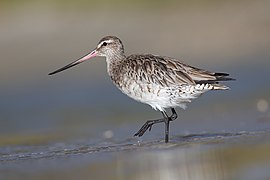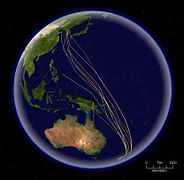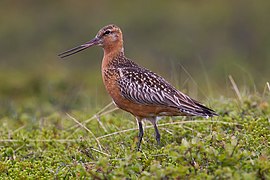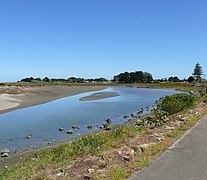Wikipedia:Meetup/Palmerston North/Godwits
-
Non-breeding plumage
-
Godwit migration from Asia to New Zealand
-
Breeding plumage
-
Manawatū Estuary
What's it about?
[edit]An edit-a-thon is an event where volunteer editors tackle a part of Wikipedia that needs improvement. Complete beginners are welcome; training and troubleshooting is provided. All you need to bring is a laptop!
This edit-a-thon is being hosted by Massey University to coincide with the late-March departure of bar-tailed godwits from the Manawatū estuary, a research topic for Dr Phil Battley from Massey University’s Ecology Group. You don't need to be an bird migration expert to take part, though: anyone can help with editing, researching, proofreading, and adding or improving photos.
When and where
[edit]

- Thursday 19 March 2020, 9:00 am – 5:00 pm NZST: people are welcome to drop in any time of the day. (This event happened six days before New Zealand entered a total lockdown due to the COVID-19 pandemic.)
- Large Group Discussion Space, Level 2, Massey University Library, Palmerston North
- This will be a social-distancing-friendly event. There is plenty of room to spread out, and if you are participating remotely feel free to Skype Adzebill 11:00–12:30 or 1:30–5:00 NZST.
- Wikipedians from anywhere in the world or stuck in quarantine are of course welcome to join in. Please feel free to hashtag edits with #godwits and add yourselves to the participants list below.
Timetable
[edit]- 9:00: Wikipedia tutorial
We'll learn how Wikipedia works and how to improve, create, and reference articles. People are welcome to attend, then come and go during the day. - 12.30: Lunch
We'll all head down to the Library cafe space for refreshments and a chat. - 16.30: Finishing up
Tidying up of the work everyone has done today and a summary of everything achieved.
To attend
[edit]- The Edit-a-thon is free and open to all, Massey staff, students, and interested members of the public are welcome.
- The format of this edit-a-thon is drop in, drop out. People are welcome to turn up when they have some time, learn a little about how Wikipedia works, and make some improvements.
- This workshop will be following "friendly space" guidelines; check them out. Harassment and disruption won't be tolerated, online or offline.
Media
[edit]- Use the link
http://w.wiki/HCXif you want a short, shareable link to this page
People attending
[edit]In person
[edit]- Giantflightlessbirds (Mike Dickison, Massey R&E, assisting newcomers)
- Six librarians and a researcher attended the introductory session on Wikipedia and had lots of questions. Half a dozen others popped in and out over the course of the day.
Remotely
[edit]What to bring
[edit]- Laptop and power cord; the venue is a nice collaborative space, with good wifi, but doesn't have computers. Laptops are definitely easier to edit on than tablets.
- Any snacks or drink you want. There are vending machines and a good cafe on the ground floor.
- Any resources such as books, journals, magazine or newspaper articles relevant to the theme of the event.
- Photos you've taken that could illustrate articles; you'll learn how to donate these to Wikimedia Commons so other Wikipedia articles can use them.
Preparation
[edit]- If you're coming, try to create a Wikipedia account beforehand: don't wait until the day to do it! Here's a form you can use if you like. Creating an account makes editing much easier (here's more info on why you should). You'll need to pick a "handle" for your username; you could use your real name, but it's nice to have the option to be a bit more anonymous if you want. Here's some advice on picking a username.
- You may want to read up on avoiding common mistakes, but Wikipedia has a "don't bite the newbies" policy, and there'll be an experienced editor there to troubleshoot.
- You don't have to be an expert; anyone who can do library research and write clearly can help improve Wikipedia. If you want to create a new Wikipedia article it's important to make sure your subject is "notable". In Wikipedia terms, "notable" people or things are those who've been covered in a number of reliable independent sources, such as news, books, authoritative websites, or magazine interviews, so dig out a half-dozen good references.
- If you want to bring photos along and add them to Commons and Wikipedia, they need to be free of any copyright or released under a Creative Commons license that lets anyone use them. (What's Creative Commons?) If they aren't, you must be the copyright owner – which means you took the photo, not someone else.
Useful
[edit]- How to edit pages using the Visual Editor: for when you click Edit
Resources
[edit]- New Zealand Birds Online entry, including lots of images we could approach photographers about donating
Outcomes
[edit]Document what you do! If you add or improve something, note it down here

Wikipedia
[edit]- Phil Battley dropped in 3 theses and 18 printed references for the bar-tailed godwit article
- Katherine Chisholm expanded diet section of bar-tailed article, added to the Protection section, adding citations.
- Added two more subspecies to article, and numerous references
- Brenda facts and newspaper citation to Nurses' Memorial Chapel
- Joanna added to Early Years sections in Aunt Daisy and Marie Clay
Wikidata
[edit]- Improved Phil F. Battley (Q35703194), added six of his publications to Wikidata, and linked his name to ten using Author Disambiguator
- Created Jesse R. Conklin (Q87923728) and added him to seven publications
- Created Chi-Yeung Choi (Q87059910) and added him to five publications
Wikimedia Commons
[edit]- Cropped down a Commons photo to chow tail barring, and rearranged and improved the image gallery
- Modified a Spanish-language distribution map for the English article.

Media
[edit]We'll be taking photos for the record.
Acknowledgements
[edit]Many thanks to the Massey University Library for supporting this event, and Research and Enterprise for bringing Wikipedian Mike Dickison to Massey.





